- Home
- Michael Duffy
Drive By Page 3
Drive By Read online
Page 3
We have always called Mr White Mr White. He has a first name, which is Ronald, a stupid name even for a skip, and the papa says he is ashamed of it and we are doing him a favour always calling him Mr White. Plus it is a mark of respect that he deserves because he has got the family out of so much trouble you wouldn’t believe. And he does Legal Aid work too, which is good as not a lot of lawyers are prepared to do that for a family with as much business as ours, because the money the government pays them is frankly shit.
There has been so much work for Mr White to do, even going up to the school in them early days, when I was still in nappies, because my older brothers and sisters was being prejudiced against because they had to sit out sport at Ramadan. That is like this big thing for us Muslims, where a whole month goes by when we can’t eat between sunrise and sunset, so active kids is getting pretty weak without food by the end of the morning and can’t go running around an oval and everything. At the end of Ramadan we have this celebration called Eid, where we is eating stuffed vine leaves and cabbage rolls all day and chocolate and mamoul, which is like this biscuit covered in icing sugar that my brother Farid is always just loving.
School was pretty different for us kids in lots of ways compared with the skips, but much worse for the sisters. It was haram, which is meaning forbidden, for them to go to sleepovers or school camps or movies, or even to wear a swimming costume where there was men. So we people is sticking together a lot because we is the only ones understanding the law of God unlike these heathens we is surrounded with all over the place.
But Mr White is not like other skips, and he is being interested in all this so that is good, and he is just loving us Habib family. He is this strange, bald guy with a bow tie and an old Rover in immaculate condition, and there is nothing he would not do for us. And now with this Rafiq thing, the papa was on the phone, breathing heavily because he is not a young man anymore, speaking quickly in the language and I move away from my workmates to make out what he’s saying, something about Mr White calling about Rafiq. Shada—that’s my youngest sister, she is so good at those Sudoko puzzles you would not believe it—had been at home and translated a few words for him, although the parents do not want the girls being involved in our business. But it was enough to know I had to ring Mr White. I did that then even though it was close to the end of lunch and Chris Taylor was coming towards us guys, about to tell us to get back to it. Some guy told me at Toyota they used to have this thing in their factory called management by walking around, and I tell you, Chris Taylor does a lot of walking around.
Mr White’s got this secretary Libby, a big fat skip so ugly no straight guy would want to work with such a person. Mr White, people make jokes and he’s single and all that, always asking how us boys is going, but personally I don’t know if he’s that way or anything, I think he just doesn’t care. P’raps he’s got something wrong down there. But anyway, none of us has ever had any trouble or anything; not like the skips is always having with their priests. I talked to Libby, on the phone she sounds real nice and you wouldn’t know how fat she is, it is strange how people’s voices don’t match their bodies. She goes, Mr White is busy, and I go, Get him to call me, like ASAP. Then I go back to work and I make sure I have something to do on the big silver SR5 down the end of the line, ’cause then I can get around the far side and see through the open bonnet if Chris Taylor is walking towards me.
When Mr White rings he goes, Do you know about this Jason Teller that got shot last week? I go, Of course I do, everyone’s been talking about it. The thing happened in our part of Sydney and it’s a real mystery, why Sam Deeb’s right-hand man should have been out here at all, and out here without protection is crazy. Farid reckons the Deebs killed him out here to put it on us and I tell this to Mr White.
Well, says Mr White, there might be something in that. But the Homicide Squad have called me to say there’s some very unpleasant rumours floating around. I don’t know how to put this, John, but the Deebs think Rafiq did it. First I is so surprised I say nothing. Then I start to laugh, I’ve got to tell you. Rafiq is a lovely guy but there is not a gram of killer in him, I have hardly even seen him ever hit someone. I had to step in a lot in our first years at school together, protect him from the Islanders and Serbs and all. I would never say Rafi is soft, but he is the one we all look after because he can’t look after himself as good as us older boys and that’s a fact, just some people are different. He’s the sort of guy likes nightclubs and nice clothes and women, nice things you know, but he is not a criminal, apart from a few drugs but there it is only taking them for a good time.
No way, I say. No way it is Rafiq and if they think that—. They do, he says. That is the problem we have. Well, I say, how are we going to fix it? Imad used to call Mr White our fixer and when he did, the old man would always turn red like he was real happy. And he is our fixer with stuff like this because he’s a skip, like the jacks, and he knows them, where the bodies are buried and all that, can do the nudgy stuff with them. So now I look up and see Chris Taylor walking towards me and tell Mr White I have to go. He is used to this, he tells me quickly the jacks want to interview Rafiq, get an alibi, so they can tell Sam Deeb he’s clean, this had nothing to do with us Habibs. Fuck, I think, talking to the jacks not being something we have ever done in a voluntary manner.
I hang up and get to working on the engine, have my hands right inside its guts when Chris Taylor comes around the big front end and has a good look at what I’m doing, looks around for the phone that I have slipped back in my pocket. He nods and says something about a training course I am to do next week and I smile at him although to be true my mind is not there. I am thinking about this conversation with Mr White, upset some low bastard is trying to frame my brother and seeing the shooting from the jacks’ point of view. The papa said a few months ago this is my strength, I can see both sides of things in a way Imad and Farid never could. It wouldn’t have helped them anyway, he said, in the business, but it helps you, it helps the family, like you can see what’s down the road. I tell you I have never been so proud in all of my life.
So now I’m thinking like a high-performance engine is running inside my head, and I see clearly along that freeway. We got to get this sorted, and it is not like we is helping the jacks. We is using them to get Rafiq out of trouble. I is planning the words I will use to the papa as soon as Chris Taylor goes away.
The first case Bec had done with Knight, the one before Beldin, lasted a month, and she’d performed well, found an important oversight made by a crime scene officer. As a reward, Knight took her with him to Brisbane to arrest the suspect, and they had dinner together. This was the first time in her career she’d spent more than fifteen minutes alone with a senior officer, not just a sergeant but someone with Knight’s age and experience.
Both were slightly bored and a long way from home, and the conversation had been more personal than it would have been back in Sydney. He told her about some of his previous investigations, and his children, and she’d refrained from asking him why he was only a sergeant, which was what everyone wondered, and talked about the recent wedding of her friend Magda, and about her brother Tiny, the trouble he’d got into. She was twenty-seven, keen to learn from older cops.
Knight was into cooking and had told her how to do a decent omelette, keep the beating to a minimum, high heat and butter not olive oil. It seemed to her the evening had gone well. She had a slightly formal way of speaking, something she’d picked up along the way and couldn’t shake. Didn’t really want to. It could set up a barrier with some folk, but Knight didn’t seem to mind. She thought they might be copacetic.
Then Beldin, the disaster, which could not be blamed on her vocabulary. It had been smoky, or slippery, like Knight himself as she’d come to see him. In the end she’d dismissed it as one of those things, him a fat guy who was just bitter and rude. She’d moved on, except now he’d hauled her back. Perhaps she was here as punishment, made to sit through Mabey’s ope
ning address to the jury, observe Knight give evidence and see how the case had made it to court after all. She wouldn’t have described him as petty, but he was a hard man to know.
There’d been a conversation with Chris Wallace on the first day, driving out to the crime scene. Even though the body had been moved hours ago, Knight had insisted they go and have a look at the park.
‘Worked with the boss before?’ she said.
‘Not much. They say he’s old school, did some stuff in the eighties. Fit-ups, maybe worse. I’ve got a mate who’s an inspector, says Knight was lucky to survive the Royal Commission.’
The great clean-out of the 1990s. For Bec’s generation of police it was ancient history, even if it had shaped their professional lives. But their generation had replaced history with biography as a way of understanding the world. Their own biographies.
Wallace was glancing at her, her breasts, frankly, as though she should be honoured by his attention. He had greasy blond hair, maybe gel gone wrong.
‘Still, he’s in Homicide,’ she said.
‘Away from temptation.’ From drugs.
‘But he’s been given this case?’
‘Maybe for redemption.’
He laughed and stopped, wanting to see if she knew what he was talking about. She did: her mother had been religious for a while, taken her to a church in a tent. Chevon had wanted to be saved, but that had not been her fate.
Wallace’s phone rang and he answered, began to talk about a problem with a car. Then to Bec, ‘Sorry about this, could be a while. Newspaper in the back.’ It was the Herald: Wallace must be aspirational. She scanned the front page, then turned to the cryptic crossword.
Turned to jelly with a baleful eye.
Pulled out a pen and began to write, a habit she’d picked up during the long watches onboard, found she was good at it.
They were almost at Roselands when Wallace finished. She folded the newspaper.
‘Sorry,’ he said. ‘Family. Where does yours live?’
‘Dubbo.’ Except for Tiny.
‘You see them much?’
‘I try not to.’ She smiled at the look on his face, him acknowledging the joke but reluctantly. ‘They’re not good people. Each time I talk to my mum, it’s a recrudescence.’
‘What?’
‘Brings it back. I talk to her on the phone and it’s always, everything she says is caprice.’
Wallace was looking affronted, as people tended to do when she spoke normally. ‘The way you talk, it’s a Dubbo thing?’
‘I’d say not.’
Due to certain events in her childhood, mainly involving her mother, there’d been a need for reconstruction. Some kids had had their teeth done, with Bec it had been language.
There was always one way to change the subject. ‘I’m Indigenous.’
‘Really?’
She didn’t look it, not so most people noticed. She had dark hair, light skin, a bit sallow. Maybe something about her nose and cheekbones. ‘It’s only an eighth.’
‘Part-Aboriginal.’
‘Just Indigenous. We don’t say part.’
She didn’t want to go into that either.
‘It must be interesting, not to look like who you are. If you don’t mind me saying.’
Deep. Although, it was one of those subjects she’d like to have a good talk about, if ever she found the right person.
Gallipoli Park was a broad and bare patch of grass with a row of trees running along the rail line on the far side. A concrete path bisected it, two benches, a garbage bin. The predominant colour was bleached khaki, with the blue and white crime scene tape strung between metal stakes framing an uncertain square in the centre. Apart from the uniform sitting in his car in the street, there was no one there, and Bec wondered if there ever was. Chevon had given her a big illustrated history of art for Christmas, one of those hardback books that look expensive but you can get them in discount stores for twenty bucks. There was an Italian painter who did views of city streets and squares, empty just like this.
Wallace spoke to the uniform and Bec walked off along the path. A plastic bag was blowing across the grass, and as she followed she saw a little pile of dog shit. This took her back to the Gordon Estate in Dubbo, and the park down the road from their house. There was a memory she had, always the same.
She was eleven and had left home early to enjoy the quiet outside, the cool before the scorching sun would turn the houses into ovens and drive people from their mattresses onto verandas, staggering in search of grog and the mild or vicious entertainments that got them through time. They did this day after day, and then they died.
One had gone already. He was lying in the park, bare feet, black trackie pants and a blue singlet. Dark brown, black hair, eyes staring at the big sky. She’d seen a few bodies in her youth, but this was the only one that still made a claim on her. Now as always she tried to remember the man’s name, what he was doing there. As always nothing came.
‘Mate?’ It was Wallace, drawing her back into the present. ‘Not much of a place to die, hey?’
Bec eyed the burnt grass, the litter beneath the line of trees. It was bigger than the park on the estate and better kept, but in the same category. Not even much of a place to live.
On the way back to Roselands they self-revealed further, it was necessary if you were going to spend long hours with people on a job. Wallace related his own conventional background with an enthusiasm that for a moment made her glad she was going to be stuck in the office. Trying to keep her vocabulary simple, she told him about her navy time, stopping refugee boats north-west of Darwin on the warm sea between Australia and Indonesia. Wallace looked sombre, and banged the steering wheel. ‘Gee, I don’t know. Those poor bastards, what they’ve gone through.’
‘Us Abos been trying to stop people coming here in boats for a long time.’
After a pause he laughed, trying to get some intelligence into the sound but it was all over the place. You could have that effect on people if you played the black card the right way.
For the next few weeks, she mainly sat at her desk in the corner, entering statements and investigators’ notes into the database. She was good at it, good at most things she did at work. Ambitious, wanted to get on. She became the general office boy, which had its unexpected advantages as she got to see how Knight ran things. This she found interesting, it took the edge off her disappointment at being inside instead of out dealing with citizens. She came to know more about the investigation than almost anyone, although there was no practical value in this. Except for once, right at the end, no one ever asked what she thought.
In the courtroom, the voir dire continued and Bec shifted her weight on the bench so its joints creaked. Hers weren’t happy either; they hadn’t done ergonomics back in the nineteenth century. The judge had already ruled several parts of the Crown case inadmissible. After half an hour of further vigorous chat, the lawyers agreed on the pertinence of other pieces of evidence, and a form of words for Mabey to use in her opening address to the jury. The judge noted these decisions would reduce the length of the trial, and congratulated the barristers on reaching agreement. Knight groaned. Bec didn’t know what was going on here, but the folk in wigs sure seemed proud of themselves.
It was time for the public galleries to be cleared while the jury was selected, and Bec stood up. Knight leaned over and tapped Mabey on the shoulder, then looked back at Bec.
‘I’ll meet you outside in that . . .’
‘Colonnade,’ said Mabey.
‘Loggia,’ said Bec.
‘Thing with arches.’
She walked out, following the Habib family through the swing doors at the end of the corridor, out onto the long veranda with a row of open arches along the street side. A group of backpackers went by, drunk and singing, a few of them working their phones as they staggered through the heat.
Bec walked out onto the footpath and stood waiting for Knight, looked down King Street at the offi
ce towers, then back at the courthouse. The complex was squat and two-storeyed, with a small dome somewhere on the roof. The facade was of small bricks and painted concrete, with black iron railings along the colonnade. It was part of the city’s waste-disposal arrangements, a human sewage system for sending refuse down a network of drains until it reached a place far away, somewhere in the archipelago of jails around the state.
There were few indications of the Supreme Court’s identity on the outside of the building. Not like the Old Bailey, or one of those American palaces of justice, which proclaim their purpose to the world. Here, it was as though the city was ashamed that a function so primitive should still be performed in surroundings otherwise devoted to the efficient making and spending of money.
Knight didn’t come and she felt impatience rising inside her at everything, the futility of being here and her stalled career. Her sorry relationships and the need to visit so often with her brother in the nursing home. She knew she had time, but it didn’t feel like it. It felt like she was still running away from too much and not towards enough.
The anger passed after a while as it generally did, but still there was no sign of Knight. She waited, trying not to think about Baby Bethane.
Mate, Mr White rings me back after work and tells me what has happened with the Homicide jacks and everything, and he says, John, you got to get Rafiq to do this interview. John is the name I am choosing after the papa announces the line in the sand, it is the skip word for Jabber. The parents is not liking me changing a good Muslim name, but it is good to have a name people at work and stuff do not laugh at. I say, Why should we trust these guys? He goes, They don’t want no more killings right now, there’s an election coming up and they do not want blood on the streets. John, you understand these political things, you know it is best for the family. Help me convince the others. So I say, I will talk with the papa and let you know.

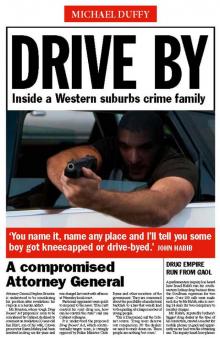 Drive By
Drive By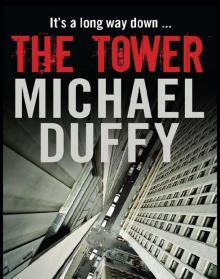 The Tower
The Tower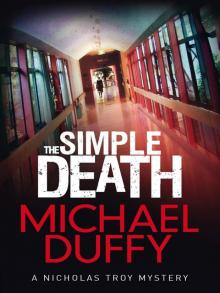 The Simple Death
The Simple Death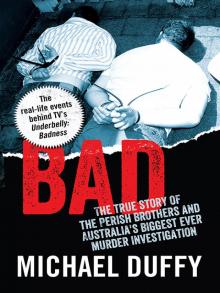 Bad
Bad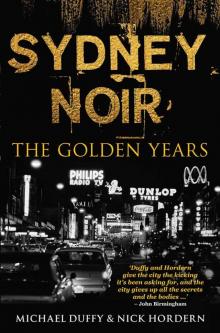 Sydney Noir
Sydney Noir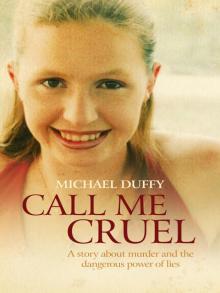 Call Me Cruel
Call Me Cruel